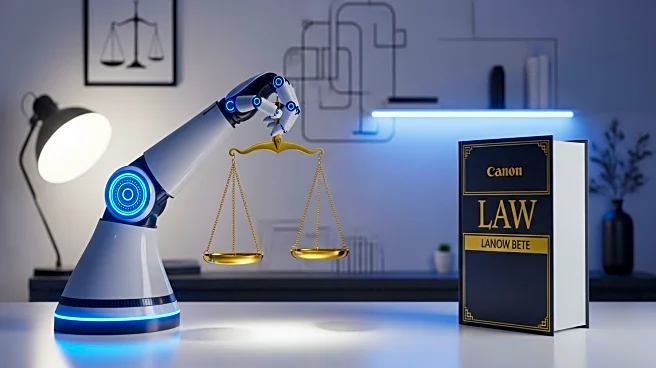What is the story about?
What's Happening?
Generative artificial intelligence is increasingly influencing the practice of law, with Biglaw firms at varying stages of adoption. Some firms have successfully integrated AI tools into their litigation processes, enhancing discovery, strategy, and outcome prediction. Others are still grappling with understanding and implementing these technologies responsibly. This disparity is becoming evident to in-house decision-makers, who are now considering technological sophistication as a potential competitive advantage in the legal industry. A ranking by BTI Consulting Group highlights firms that are leading in AI-infused litigation, categorizing them into Gen AI Powerhouses, Leaders, and Distinguished firms. Notable firms such as Cooley, DLA Piper, and Latham & Watkins are recognized for their adept handling of AI in various legal domains.
Why It's Important?
The integration of generative AI in litigation represents a significant shift in legal practices, potentially redefining competitive dynamics within the industry. Firms that effectively leverage AI tools may gain a strategic edge, attracting corporate counsel seeking technologically advanced legal representation. This trend underscores the growing importance of technological proficiency in legal services, which could influence firm rankings and client trust. As AI continues to evolve, firms that fail to adapt may find themselves at a disadvantage, impacting their market position and client relationships.
What's Next?
As generative AI becomes more entrenched in legal practices, firms are likely to continue refining their AI strategies to maintain competitiveness. This may involve investing in AI training, developing proprietary AI tools, or forming strategic partnerships with tech companies. The legal industry may also see increased collaboration between firms and AI experts to address ethical and regulatory challenges associated with AI use. Stakeholders, including corporate clients and legal professionals, will be closely monitoring these developments to assess the impact on litigation outcomes and industry standards.
Beyond the Headlines
The adoption of generative AI in litigation raises ethical and legal considerations, such as data privacy, bias in AI algorithms, and the potential for AI to replace human judgment in critical legal decisions. These issues may prompt discussions on regulatory frameworks and best practices to ensure responsible AI use in the legal sector. Additionally, the shift towards AI-driven practices could influence law school curricula, emphasizing the need for future lawyers to be proficient in technology and data analysis.















